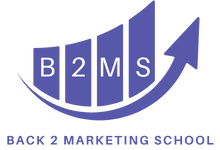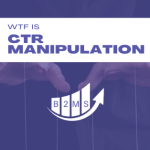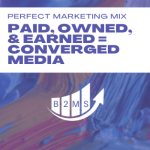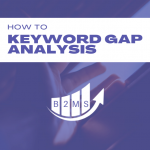The working relationship between SEO and SEA
SEO and SEA should not be two separate areas. On the contrary, both strongly complement each other and should be working together in the digital marketing mix.
But before we analyze the possible overlaps, we must first define the differences.
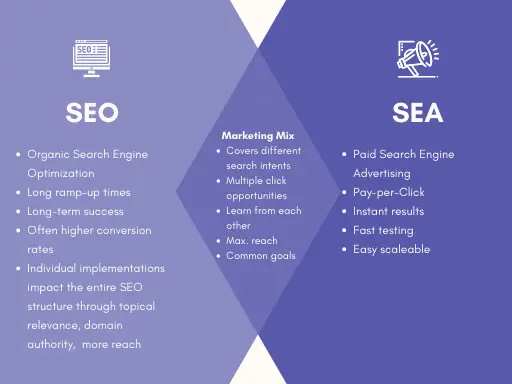
SEO Search Engine Optimization
SEO pursues the goal of ranking as high as possible in organic search results pages. There is a strong overlap with content marketing to create content for the website and optimize it to achieve best possible organic outcomes.
Search Engine Optimization also includes technical on-site SEO to ensure the health of the site and make it easier for search engine crawlers to understand the content.
While SEO also focuses on and optimizes individual keywords, organic marketing involves an overall structure. Not every blog post needs to rank at position 1 in Google to have a positive effect on the overall site. For example, content clusters generate thematic authority and thus the entire page will rank better for a topic.
SEA or SEM
SEA stands for Search Engine Advertising and is also often called search engine marketing or short SEM.
In contrast to SEO, SEA is paid advertising of certain search terms. Platforms such as Google Ads, Bings Ads, or Ecosia offer PPC advertising campaigns (pay-per-click). Advertisers pay a price per click on the search ad.
An advantage of SEA is that paid search results can be effective immediately. Once keywords are selected, ads are created and live, the ads show up in the search results. With SEO, it often takes between 6 and 9 months for a new article to be indexed and fully understood by Google, for example. This is also referred to as Google Sandbox Effect.
SEA campaigns can also link to other sites or subdomains to create a logical distinction between the website and brand, if necessary.
How and where do I recognize SEA ads?
PPC ads are marked as paid media ads in the search results:
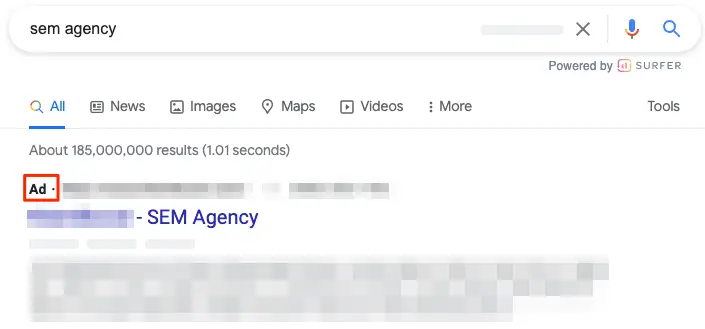
Google Ads can appear in different positions:
- Above the organic search results. Usually, between 2 and 3 ads are displayed on top of the search results. However, there can be none at all, only one, or even more than 3.
- Below the organic results. Before you have the option to navigate to the next page of search results, you often get up to 2 more ads displayed.
- Google Maps/3-Pack: For local search terms such as SEM Agency Baltimore or entire industries such as in hospitality marketing, both organic and a possible paid Google Business Profile (formerly Google My Business) are displayed below a Google Maps preview. Ads can also be played out above and below the organic rankings for direct searches on Google Maps.
- Special formats: Shopping or even verified services are displayed for certain search terms.
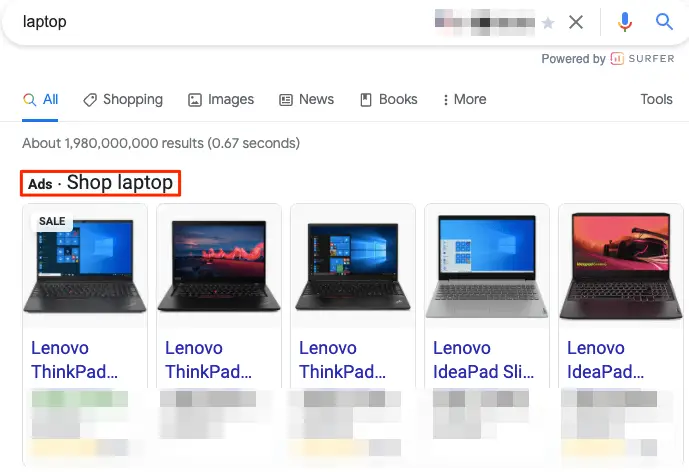
The relationship between SEO and SEA
SEO and SEA marketing disciplines are more connected than often thought. SEA allows you to test keywords very quickly and then incorporate them into your SEO strategy for the long term. In the end, both strategies pursue the same inbound marketing goals, like increasing traffic and generating leads.
In addition, organic keywords can also influence SEA campaigns by either adding or even excluding additional keywords. Reasons for excluding keywords could be that organically there are no conversions, or the presence is so good that the budget is better allocated to other keywords.
On the other hand, keywords can be added to cover different search intentions if necessary. For example, an informational page might rank well organically for a keyword, but through a PPC campaign you can link to a landing page with buying intent.
Sometimes it also makes sense to be represented multiple times for a search term, simply to get more opportunities for a click, and on the other hand, so that no competing ad steals the traffic.
Keywords should be regularly analyzed together – between SEOs and performance marketers – and a joint strategy should be developed.
Can SEO and SEA influence each other?
There is a rumor that SEA clicks have a positive impact on SEO rankings. However, there is no evidence for this and in fact, Google itself makes it clear that this is not the case.
Therefore, you cannot buy organic rankings (even indirectly).
Differences between SEO and SEA
In the long run, organic website visitors convert better than those generated by PPC advertising. This is another reason why the return on marketing investment is better for SEO campaigns than for SEA. Long-term results increase returns while costs remain the same. A blog post may cost $500 to create, but can, directly and indirectly, generate leads over and over again for a long time.
SEO also has the advantage of a higher reach. For PPC campaigns, the reach depends on the number of keywords, the match type of keywords, and ultimately the advertising budget. SEO often has positive spillover effects, so you rank better overall due to higher domain authority, thematic relevance, and also long-tail keywords.
On the other hand, SEA is easier to optimize and scale.
When to use SEO and when to use SEA?
Organic search engine optimization and search engine marketing co-exist but also separately. SEA should be used whenever organic results are not (yet) achieved for certain keywords, or to secure a place at the top – even before the organic search results.
SEO should be planned for the long term and ideally complement or even replace some paid keywords. Through SEA campaigns, keywords can also be tested first before implementing an SEO campaign with content creation.
In addition, SEA makes sense when immediate successes must be booked, such as short-term lead generation.
However, SEO should not be put on the back burner, but should be a continuous part of the marketing strategy. It can take time for SEO results to take effect. It is often referred to as hockey stick growth, as SEO growth skyrockets exponentially after a certain point. In addition, SEO offers the opportunity to rank in organic search results with images and videos as well.
Unlike SEA, successes can have long-term duration. If the advertising budget is stopped, no more clicks will occur. Then SEO must completely replace SEA campaigns.

Sascha is a Lifecycle Marketing Consultant with over 8 years of digital marketing experiences in Silicon Valley, the UK, and Germany.
After leading the demand generation for a 100+ million company, he decided to venture out on himself. He’s now helping clients to attract and convert more leads and customers.
His main focus are SEO, paid media & marketing automation – all with the focus to tie marketing campaigns to revenue.
Sascha has been featured in industry publications.
